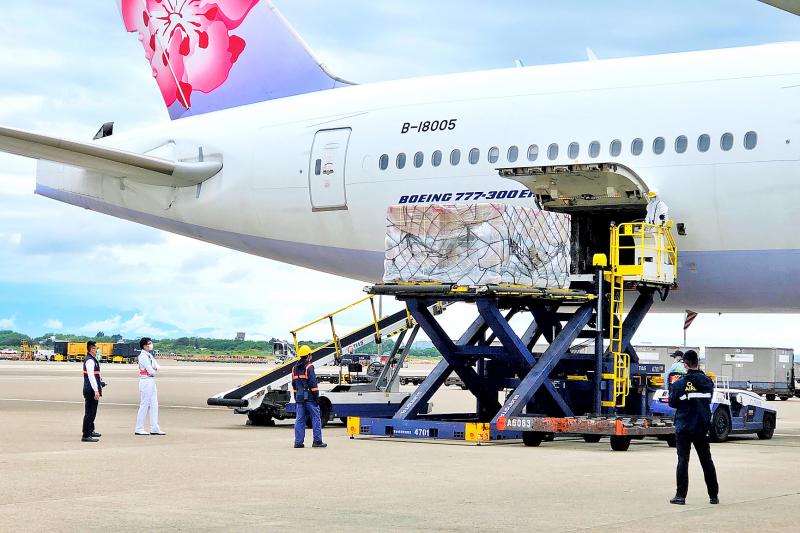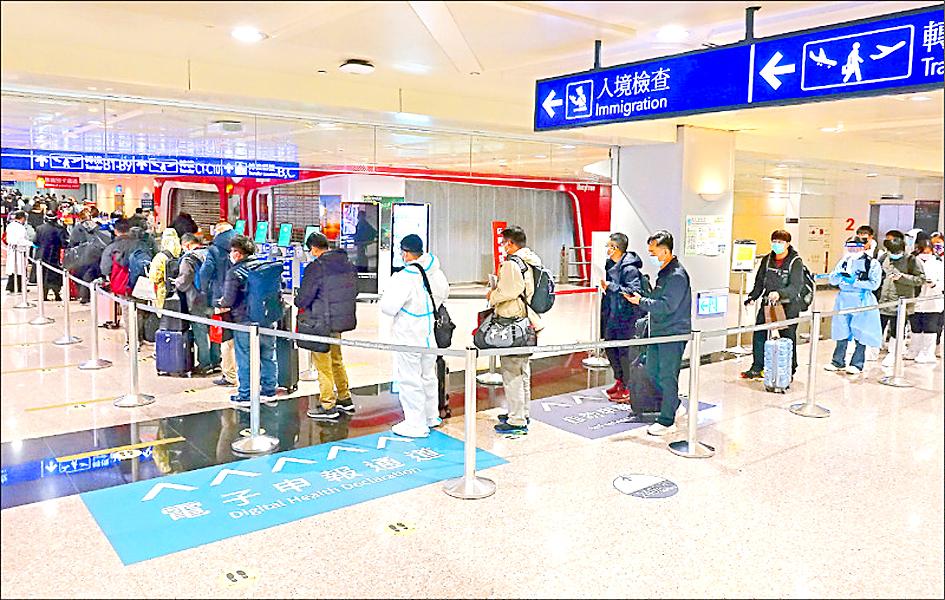Starting next week, the mandatory home quarantine for inbound travelers is to be shortened to seven days, followed by seven days of self-health management, the Central Epidemic Command Center (CECC) said yesterday.
Minister of Health and Welfare Chen Shih-chung (陳時中), who heads the center, said that travelers on flights arriving in Taiwan after 12am on Monday would need to quarantine at home for seven days, not 10 days.
People in quarantine would need to be tested for COVID-19 twice: a polymerase chain reaction (PCR) test at the airport upon their arrival (day zero) and a rapid COVID-19 test on the day of their release from quarantine (day 7), Chen said.

Photo: CNA
If symptoms arise during quarantine, the traveler should conduct a rapid test and report to their local health department if the result is positive, he said.
The quarantine principle is still “one person per household,” and if the requirement cannot be met, the inbound traveler should quarantine at a hotel for seven days, he added.
Two at-home rapid test kits are provided to inbound travelers at the airport: one for the final required test and one in the case of symptoms, the center said.

Photo: Taipei Times
Only PCR tests should be used for quarantined infants under the age of two, it said.
People can ask local authorities for assistance if they have trouble conducting a rapid test.
Chen said the center should consider exempting people from isolation if they have received a booster shot and can provide a negative result to a rapid COVID-19 test.
He made the comment after being asked to confirm a Mirror Media magazine report about a plan to drop the home isolation policy from next month if the percentage of Taiwanese with a booster shot rises, and COVID-19 cases with severe complications and deaths remain low.
“Similar plans are being discussed, but many factors continue to change — so I will announce plans when they have been finalized,” Chen said.
Separately, National Taiwan University College of Public Health professor Chan Chang-chuan (詹長權) on Monday wrote that the average incidence rate of COVID-19 in Taiwan over the past week was about 387 per million, comparable to the nation’s main trading partners (between two and 415 per million) and that the number of new domestic cases was 46 to 113 times the number of imported cases on a given day.
As Taiwan relies heavily on global trade and international exchanges, and the government is transitioning toward living with the virus, border controls should be revised, he said, adding that the quarantine measures for confirmed cases and their close contacts should be similar.
Chan said that officials should consider the methods adopted by countries that have reopened their borders by first easing restrictions on foreign travelers with a booster shot and a negative test result.

The US government has signed defense cooperation agreements with Japan and the Philippines to boost the deterrence capabilities of countries in the first island chain, a report by the National Security Bureau (NSB) showed. The main countries on the first island chain include the two nations and Taiwan. The bureau is to present the report at a meeting of the legislature’s Foreign Affairs and National Defense Committee tomorrow. The US military has deployed Typhon missile systems to Japan’s Yamaguchi Prefecture and Zambales province in the Philippines during their joint military exercises. It has also installed NMESIS anti-ship systems in Japan’s Okinawa

TRAGEDY STRIKES TAIPEI: The suspect died after falling off a building after he threw smoke grenades into Taipei Main Station and went on a killing spree in Zhongshan A 27-year-old suspect allegedly threw smoke grenades in Taipei Main Station and then proceeded to Zhongshan MRT Station in a random killing spree that resulted in the death of the suspect and two other civilians, and seven injured, including one in critical condition, as of press time last night. The suspect, identified as a man surnamed Chang Wen (張文), allegedly began the attack at Taipei Main Station, the Taipei Fire Department said, adding that it received a report at 5:24pm that smoke grenades had been thrown in the station. One man in his 50s was rushed to hospital after a cardiac arrest

‘WIN-WIN’: The Philippines, and central and eastern European countries are important potential drone cooperation partners, Minister of Foreign Affairs Lin Chia-lung said Minister of Foreign Affairs Lin Chia-lung (林佳龍) in an interview published yesterday confirmed that there are joint ventures between Taiwan and Poland in the drone industry. Lin made the remark in an exclusive interview with the Chinese-language Liberty Times (the Taipei Times’ sister paper). The government-backed Taiwan Excellence Drone International Business Opportunities Alliance and the Polish Chamber of Unmanned Systems on Wednesday last week signed a memorandum of understanding in Poland to develop a “non-China” supply chain for drones and work together on key technologies. Asked if Taiwan prioritized Poland among central and eastern European countries in drone collaboration, Lin

ON ALERT: Taiwan’s partners would issue warnings if China attempted to use Interpol to target Taiwanese, and the global body has mechanisms to prevent it, an official said China has stationed two to four people specializing in Taiwan affairs at its embassies in several democratic countries to monitor and harass Taiwanese, actions that the host nations would not tolerate, National Security Bureau (NSB) Director-General Tsai Ming-yen (蔡明彥) said yesterday. Tsai made the comments at a meeting of the legislature’s Foreign Affairs and National Defense Committee, which asked him and Minister of National Defense Wellington Koo (顧立雄) to report on potential conflicts in the Taiwan Strait and military preparedness. Democratic Progressive Party (DPP) Legislator Michelle Lin (林楚茵) expressed concern that Beijing has posted personnel from China’s Taiwan Affairs Office to its